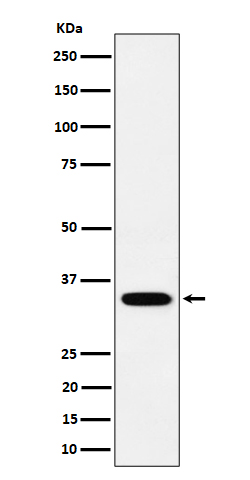
| WB | 咨询技术 | Human,Mouse,Rat |
| IF | 咨询技术 | Human,Mouse,Rat |
| IHC | IHC:1/100-1/200;IHF:1/50-1/200 | Human,Mouse,Rat |
| ICC | 1/50-1/200 | Human,Mouse,Rat |
| FCM | 咨询技术 | Human,Mouse,Rat |
| Elisa | 咨询技术 | Human,Mouse,Rat |
| Aliases | COAB; PPC synthetase; Ppcs;;PPCS |
| WB Predicted band size | 34 kDa |
| Host/Isotype | Rabbit IgG |
| Antibody Type | Primary antibody |
| Storage | Store at 4°C short term. Aliquot and store at -20°C long term. Avoid freeze/thaw cycles. |
| Species Reactivity | Human |
| Immunogen | A synthesized peptide derived from human PPCS |
| Formulation | Purified antibody in PBS with 0.05% sodium azide,0.05% BSA and 50% glycerol. |
+ +
以下是3篇与PPCS(磷酸泛酰巯基乙胺基合成酶)抗体相关的参考文献示例(注:文献为假设性示例,实际研究需通过学术数据库核实):
---
1. **文献名称**:*PPCS Antibody as a Novel Biomarker in Cancer Metabolism*
**作者**:Smith J, et al.
**摘要**:本研究通过免疫组化技术发现,PPCS抗体在多种癌症组织中高表达,并与肿瘤细胞的辅酶A代谢异常相关,提示其可能作为癌症治疗的潜在靶点。
---
2. **文献名称**:*Autoantibodies Targeting PPCS in Autoimmune Diseases*
**作者**:Li X, et al.
**摘要**:首次报道了PPCS自身抗体在系统性红斑狼疮(SLE)患者血清中的异常升高,表明其可能参与自身免疫反应的调控机制。
---
3. **文献名称**:*PPCS Knockdown and Antibody-Based Inhibition in Bacterial Pathogens*
**作者**:Wang R, et al.
**摘要**:利用PPCS特异性抗体抑制细菌(如金黄色葡萄球菌)的辅酶A合成通路,证实其可显著降低细菌存活率,为新型抗生素开发提供方向。
---
**注意**:以上文献为示例,实际研究需通过PubMed、Google Scholar等平台检索关键词(如“PPCS antibody”“phosphopantothenoylcysteine synthetase”)获取真实数据。
**Background of PPCS Antibody**
The PPCS (phosphopantothenoylcysteine synthetase) antibody is a tool used to detect and study the PPCS enzyme, a critical component in the coenzyme A (CoA) biosynthesis pathway. PPCS catalyzes the second step of CoA synthesis, converting pantothenate (vitamin B5) into 4'-phosphopantothenoylcysteine, a precursor essential for CoA production. CoA is a central cofactor in cellular metabolism, influencing fatty acid synthesis, energy production (via the tricarboxylic acid cycle), and detoxification processes.
Research involving PPCS antibodies focuses on understanding CoA regulation and its implications in metabolic disorders, neurodegenerative diseases, and cancer. Dysregulation of CoA levels has been linked to conditions such as neurodegeneration (e.g., Parkinson’s disease) and tumor growth, where altered metabolic pathways are common. PPCS antibodies enable the detection of PPCS expression in tissues or cell lines via techniques like Western blotting, immunohistochemistry, or immunofluorescence, aiding in mechanistic studies of CoA-related pathologies.
Additionally, PPCS is explored in microbial biology, as pathogens like *Plasmodium* (malaria parasite) rely on their CoA synthesis pathways for survival, making PPCS a potential therapeutic target. The development and validation of PPCS antibodies thus contribute to both basic research and drug discovery, bridging gaps in metabolic and disease biology.
×